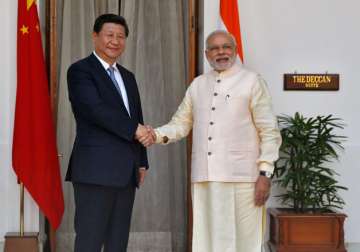Natural to have differences with India, says China; hopeful of better ties next year
China today said that it is hopeful of resolving pending differences with India next year including the admission of the latter in the Nuclear Suppliers Group (NSG) and listing of Pakistan-based Jaish-e-Mohammed chief Masood Azhar as a terrorist by t

China today said that it is hopeful of resolving pending differences with India next year including the admission of the latter in the Nuclear Suppliers Group (NSG) and listing of Pakistan-based Jaish-e-Mohammed chief Masood Azhar as a terrorist by the UN.
While summing up Beijing’s perception of the outgoing year and its vision of Sino-Indian ties for the next year, Chinese foreign ministry spokesperson Hua Chunying said that the two nations signed off their most engaging year bogged down by the twin issues.
“This year has seen a steady development of China-India relations, with the two countries marching towards the goal of building a more closely-knit partnership for development,” Hua said.
“The leadership of the two countries have maintained frequent contacts despite the differences,” Hua added as she referred to a number of meetings between Prime Minister Narendra Modi and Chinese President Xi Jinping at multilateral foras like G-20 and BRICS summit.
She said that the dialogues and consultations have been going on in an orderly fashion at all levels and practical cooperation in various fields has been carried out steadily.
“As close neighbours, it is natural for our two big countries to have differences, and we have been exploring ways to resolve them through diplomatic channels. The main theme of China-India relations remains friendship and cooperation,” she said, holding out hope for a more fruitful year for bilateral ties next year with the resolution of the two major issues.
“For the year 2017, China would like to work with India for better implementation of the important consensus reached between the leadership, greater political mutual trust, wider mutually beneficial cooperation and properly management of differences so as to ensure a sustained and steady development of China-India relations,” she said.
The strength of the deep diplomatic engagement between the two sides virtually begins with the New Year as China’s second “technical hold” on India’s application for listing Azhar as terrorist under UN’s 1267 Committee will expire on December 31, opening a new window for both the countries to address the issue which cast a shadow on Beijing’s claim to fight terrorism in all forms as the Pakistan-based JeM is already listed by the UN as terror group.
With the end of the second technical hold by China, India is expected to submit a fresh application backed by a charge sheet filed recently by the National Investigation Agency against Azhar for his involvement in the Pathankot terror attack.
The charge sheet was expected to further reinforce India’s case for a UN ban against Azhar. Other members of the Committee including UNSC permanent members, US, Russia, France and UK had backed it earlier.
Indian officials hope that the charge sheet provides strong basis for the case for China to take a relook as Beijing in the past argued that sufficient evidence has not been provided.
"Listing in the 1267 Committee must be in line with the relevant resolutions of the UNSC and the rules of procedure of the Committee," Hua had said, replying to question on Azhar's issue days after NIA filed charge sheet.
On India s admission into the Nuclear Suppliers Group too Indian and Chinese officials hope for a way out next year as China, after blocking India's bid, began an exercise to work out a "non-discriminatory formula" to admit new members.
It is unclear yet whether a formula can be worked out where the other members of the NSG will agree for admission of China's close ally Pakistan, whose record in nuclear proliferation during the time of its disgraced nuclear scientist Dr AQ Khan will be a stumbling block.
China is advocating a two step approach for admission of countries who have not signed nuclear-Non Proliferation Treaty (NPT) in the NSG. As per the new stand announced by Beijing last month, it first wants to find a solution that is applicable to the admission of all non-NPT members followed by discussions to admit specific non-NPT member.
Indian officials say it will make it another engaging year in Sino-Indian diplomacy on both Azhar and NSG fronts and hope that it would not be a futile exercise as happened this year.
However, even after the resolution of the two issues, the larger issues like the China-Pakistan Economic Corridor (CPEC) remain. Modi himself raised this issue with Xi during their meeting at the Chinese city of Hangzhou in September.
Significantly, as the year draws to a close, Lt Gen Amir Riaz, Commander of the Pakistan's Southern Command which is based in Quetta, asked India to "shun enmity" with Pakistan and "join the CPEC along with Iran, Afghanistan and other Central Asian countries and enjoy its benefits".
Chinese officials say Riaz's comments are significant as they point to the backing of the Pakistan army.
Hua said that China is open for such a proposal and wondered "what is India’s take on this whether this is a good sign from Pakistan".
While relations appears to have been bogged down over the NSG, Azhar and CEPC which involves Pakistan, officials on both sides say that 2016 was an year of deep engagement between both the countries covering almost all aspects of the relations including the military.
With PTI Inputs